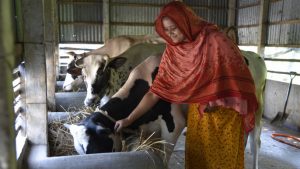This week, dairy farmers nationwide will receive information from DairyNZ about the Mycoplasma Bovis Biosecurity Response Levy being set at 2.9 cents per kilogram of milksolids for the 2019-20 year. The levy will be collected by dairy supply companies from September 1.
For the 2019-20 year, at 2.9c/kg milksolids, dairy farmers will pay on average $4300 each from September 1, 2019, to May 31, 2020, based on a 430-cow farm.
Southland Federated Farmers vice-president Bernadette Hunt said although the amount might not seem a lot, the number of levies and taxes being added to farmers’ budgets was starting to take a toll.
“On its own it won’t have a massive effect but there are so many levies and tax increases now that they are having a cumulative effect. You have changes to health and safety, changes to employment legislation, biosecurity levies, some of the implementations around water quality that may be paid for with levies – all of those things are impacting on farmers for sure.
“While we all acknowledge the M.bovis response is something everyone has to pay for and that the farming sector should have to make an extra contribution, they should also have an assurance that that extra money is being used well and effectively to manage the response and it’s not being wasted.”
The Government and farming sector bodies announced in May 2018 that they would attempt to eradicate the disease.
To date, there have been 179 properties infected with the disease, and 108,182 cows have been slaughtered nationwide in the fight to eradicate it.
The Government and Beef + Lamb New Zealand fund 70 percent of the costs, with the dairy portion being the remaining 30 percent.
DairyNZ chief executive Dr Tim Mackle said the organisation consulted with farmers earlier this year about increasing the biosecurity response levy cap to 3.9c/kg milksolids in order to pay its share of the M. bovis response
“The 2.9c/kg milksolids is obviously less than the 3.9c/kg milksolids cap we put in place. This reflects our conversations with farmers, plus the work we’ve been doing with the Ministry for Primary Industries (MPI) to develop the terms of payback in the operational agreement we have negotiated.
“We obviously want to keep the costs as low as possible for our farmers, but at the same time we have a share that needs to be repaid. It took some time after the consultation for the regulatory process with MPI and we’re now in a position to collect the levy, giving farmers more than 30 days’ notice,” Mackle said.
“Our continued focus on the M. bovis response is vital, as is support for affected farmers. We’ve learnt a huge amount over the last two years about responding to this disease. The recently commissioned DairyNZ independent review has highlighted areas of continued focus, which will only strengthen how we all respond,” said Dr Mackle.
The 2020-21 M. bovis Biosecurity Response Levy, including any changes to the levy amount, will be communicated in April 2020, ready for collection on June 1, 2020.













